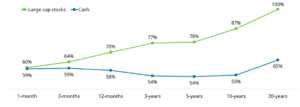
When the Bank of England (BoE) chose to cut the base rate in August, you might have been concerned about what this could mean for you.
Since the cut, the BoE has held rates steady, but the BBC reports that markets expect at least one further interest rate cut before the end of 2024. The next meeting of the BoE Monetary Policy Committee (MPC) is expected on 19 November.
One of the most immediate effects of the base rate cut has been a drop in the interest rates that are available on cash savings accounts. Easy access and longer-term fixed savings accounts have been affected. So, if you hold money in an account like this, you might already have noticed that the interest rate you receive on your savings has fallen.
Fortunately, we can help you to continue to benefit from the most competitive rates. Read on to learn more about why it’s so important to shop around to find the best rate and how our cash savings platform can help you.
The base rate cut in August has led many high street banks to lower the interest rate offered on savings accounts
When inflation began to rise at the end of 2021, central banks around the world, including the BoE, started to increase interest rates in a bid to bring price rises back to a more manageable rate. The base rate in the UK peaked at 5.25% and has remained at this level since August 2023.
Now, UK inflation has fallen and is much closer to the BoE’s target of 2%. So, to avoid putting unnecessary pressure on businesses and consumers, the BoE has begun to cut the base rate. At their August meeting, the MPC reduced the base rate from 5.25% to 5%.
Even though the base rate was held steady at the most recent meeting in September, interest rates on savings accounts have already begun to fall in response to the August cut. Hargreaves Lansdown reports that, at the start of August, there were 30 one-year fixed-term savings accounts paying above 5% interest, but by the start of September there were fewer than 10.
Moreover, the average interest rate on an easy access savings account had fallen to 3.07% at the start of September – the first time in a year that the average rate had dipped below 3.1%.
So, if you hold cash savings, you might already have noticed a drop in the interest rate you’re receiving.
It’s important to secure competitive rates on your savings to mitigate the impact of inflation on your wealth
Though cash savings aren’t at risk of falling in value in the same way that your investments could be, holding too much of your wealth in cash presents a different risk. Over time, inflation can erode the real-terms value of your savings, even if you are earning interest on them.
The graph below shows the percentage of time periods between 1926 and 2023 when cash and US stocks beat inflation.

Source: Schroders
As you can see, holding wealth in cash means that inflation is likely to have a detrimental effect on the value of your savings. By comparison, investments held in the stock market are more likely to outstrip inflation, particularly if you hold them for a longer period of time.
So, it’s important to shop around to secure the most competitive rate on your cash savings to mitigate the impact of inflation on your wealth.
According to the Office for National Statistics (ONS), inflation in the UK was 1.7% year-on-year in September 2024. This means that the average easy access savings account interest rate exceeds the rate of inflation, which is highly unusual.
But, with further interest rate cuts expected before the end of this year and in 2025, interest rates may soon fall below the rate of inflation. As a result, the spending power of your savings could fall over time.
We can help you protect your wealth as interest rates fall so that you can continue to work towards your long-term goals
Though holding wealth in cash exposes your savings to the effects of inflation, easy access savings may still form an important pillar of your financial plan. For example, we usually recommend holding 3-6 months’ worth of expenses in an easy access savings account so that you can easily cover unexpected or emergency costs. If you are already in retirement, we might recommend holding more than this in your emergency fund; the exact amount that is suitable for you will depend on your circumstances.
As well as advising you about how much is sensible to hold in cash, there are two ways we can help you to protect your wealth as interest rates fall.
1. Helping you to secure competitive rates on your cash savings using our platform Insignis Cash
We use a platform called Insignis Cash, which enables you to benefit from the best rates on the market. Even as interest rates fall, Insignis Cash can help you to make sure you earn as much interest as possible on your cash savings to mitigate the impact of inflation on your wealth.
2. Balancing your investments to mitigate risk and help you to grow your wealth
As you read above, investing in stocks can give your money more opportunities to outstrip inflation. As a result, you may be able to grow your wealth and move closer to achieving your long-term goals. So, though we’ll usually recommend that you hold some wealth in cash to cover emergencies, we can also help you to build a balanced investment portfolio.
Get in touch
Our team of independent financial advisers in Lewes is here to support you in managing your wealth and working towards your long-term goals.
To find out more, please get in touch by emailing us at financial@barwells-wealth.co.uk or by phone on 01273 086 311.
Please note
This article is for general information only and does not constitute advice. The information is aimed at retail clients only.
The value of your investments (and any income from them) can go down as well as up and you may not get back the full amount you invested. Past performance is not a reliable indicator of future performance.
Investments should be considered over the longer term and should fit in with your overall attitude to risk and financial circumstances.







 Production
Production